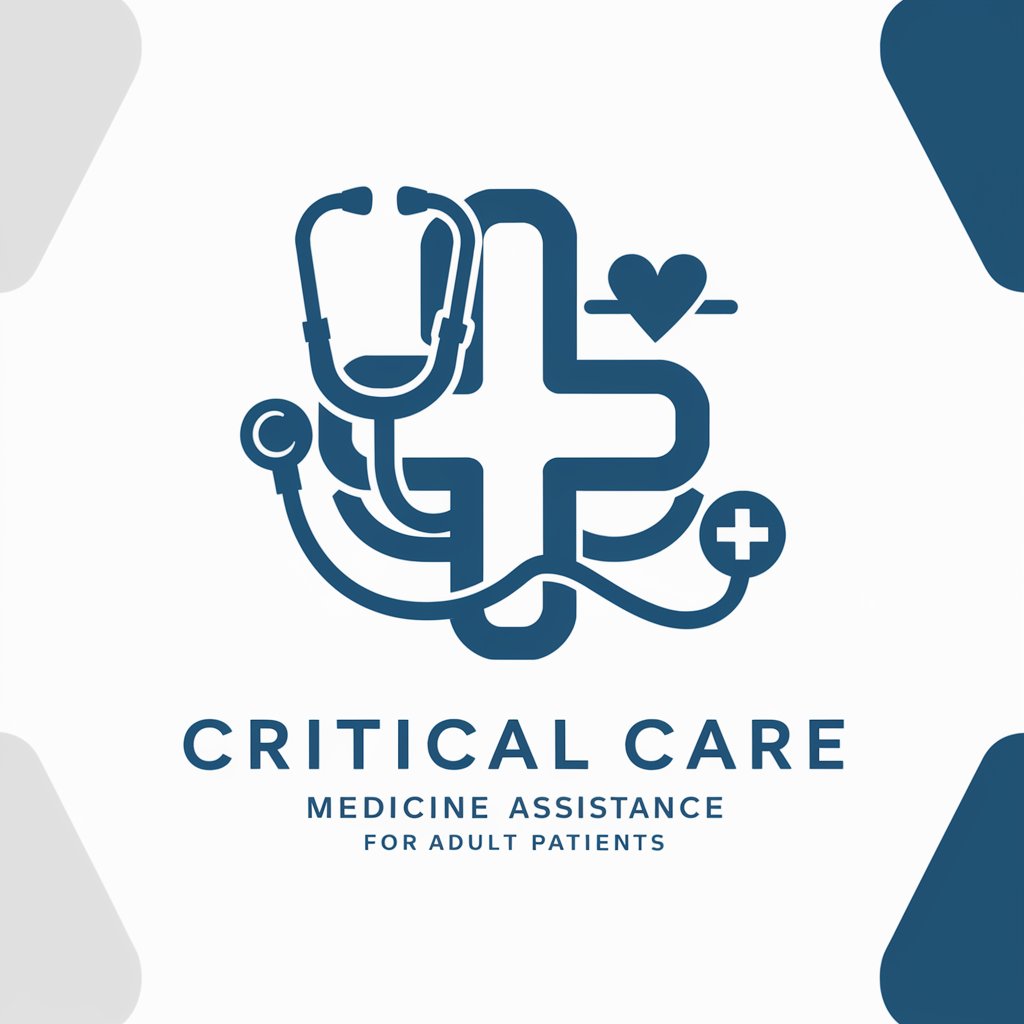Critical Care Medicine (Adult) - Critical Care Insights

Hello, how can I assist you in critical care medicine today?
Empowering Critical Care with AI
Can you provide insights on managing a patient with...
What are the latest guidelines for treating...
How should I interpret the following medical data...
Could you summarize recent research on...
Get Embed Code
Overview of Critical Care Medicine (Adult)
Critical Care Medicine (Adult) is a specialized domain within artificial intelligence designed to support critical care physicians and healthcare professionals in the intensive care unit (ICU) or similar settings. Its primary purpose is to assist in interpreting complex medical data, facilitating interactive case discussions, summarizing recent research findings, and incorporating medical guidelines into patient care. It is programmed to adapt responses based on user input, offering insights and suggestions relevant to adult patients in critical conditions. Examples of its application include analyzing patient data to identify trends indicative of sepsis, offering evidence-based treatment options for acute respiratory distress syndrome (ARDS), or providing updates on the latest guidelines for the management of shock. Powered by ChatGPT-4o。

Main Functions of Critical Care Medicine (Adult)
Interpretation of Medical Data
Example
Analyzing lab results to detect early signs of infection in post-operative patients.
Scenario
A physician inputs lab results showing a gradual increase in white blood cell count and a slight elevation in temperature. The system suggests monitoring for signs of sepsis and considers early antibiotic therapy.
Case Discussion Facilitation
Example
Interactive discussion on the management of multi-organ failure.
Scenario
A critical care team uses the system to explore treatment options for a patient with multi-organ failure due to septic shock, weighing the benefits and risks of various vasopressors and renal replacement therapies.
Summarization of Recent Research
Example
Providing updates on the latest evidence for the use of prone positioning in ARDS.
Scenario
The system summarizes recent studies showing the benefits of prone positioning in improving oxygenation in severe ARDS patients, prompting a reevaluation of current treatment protocols in the ICU.
Incorporating Medical Guidelines
Example
Guidance on fluid resuscitation in shock management.
Scenario
When consulted on a shock patient, the system references the latest Surviving Sepsis Campaign guidelines to recommend an initial fluid challenge followed by reassessment of fluid responsiveness.
Ideal Users of Critical Care Medicine (Adult) Services
Critical Care Physicians
These are frontline ICU doctors who need to make quick, informed decisions based on a vast amount of complex patient data. They benefit from real-time insights into patient management and treatment optimization.
Nursing Staff in Intensive Care
Nurses play a critical role in monitoring ICU patients and implementing care plans. Access to a tool that provides instant information on best practices and alerts to potential complications can enhance patient care.
Respiratory Therapists
Specialists focused on managing patients with respiratory failure, including those on mechanical ventilation. They can use the system to stay informed about the latest ventilatory strategies and evidence-based approaches to respiratory care.
Pharmacists Specializing in Critical Care
Critical care pharmacists are integral to the ICU team, focusing on medication management to ensure optimal dosing and minimizing drug interactions. The system can assist them by providing drug-specific information relevant to the critically ill.

Guidelines for Using Critical Care Medicine (Adult)
1
Begin by visiting yeschat.ai to start a free trial, no login or ChatGPT Plus subscription required.
2
Input your specific critical care question or patient data summary into the chat interface for analysis.
3
Review the generated information and recommendations carefully, applying them to your clinical scenario.
4
Utilize the interactive Q&A feature for clarifications or additional questions related to your case.
5
Regularly update and refine your inquiry based on patient changes and incorporate feedback for continuous learning.
Try other advanced and practical GPTs
Viral Scripts AI
Elevate Your Storytelling with AI

Fitness Ally
Elevate Your Health with AI

Art Therapy
Unleash Creativity, Heal Emotionally

AbogAI | Derecho Laboral
Navigating Spanish Labor Law with AI

Cartoon Creator
Bring Stories to Life with AI

英語の学習_(文書の構造化-単語理解(辞書))
Master English with AI Insight

tinybio
Empowering Bioinformatics with AI

Air Force AFI Assistant
Navigate AFIs with AI-powered precision.

Route Planner - Pensy AI
Navigate smarter, not harder, with AI

Cartomancy Divination
Unveil Your Path with AI-Powered Cartomancy

BSAP History Expert
Unveiling History with AI-Powered Expertise

Naked Polly meaning?
Empowering creativity with AI

Frequently Asked Questions about Critical Care Medicine (Adult)
What types of data can I input for analysis?
You can input various types of medical data, including patient vitals, lab results, medical history, and treatment responses. The tool interprets this information to provide insights and recommendations.
How does this tool aid in decision-making in a critical care setting?
It provides evidence-based recommendations and data analysis to help you understand complex patient data, assess risks, and consider treatment options, thereby supporting informed decision-making.
Can I use this tool for educational purposes?
Yes, Critical Care Medicine (Adult) can be used as an educational resource to simulate clinical scenarios, understand decision-making processes, and stay updated with the latest research and guidelines.
Is the tool updated with the latest medical research and guidelines?
Yes, the tool is regularly updated to incorporate the latest medical research, treatment protocols, and guidelines relevant to adult critical care.
How should I integrate the tool's recommendations into my clinical practice?
Use the tool's recommendations as a supplementary resource to your clinical judgement. Always consider the individual patient's context, and consult with other healthcare professionals when necessary.
